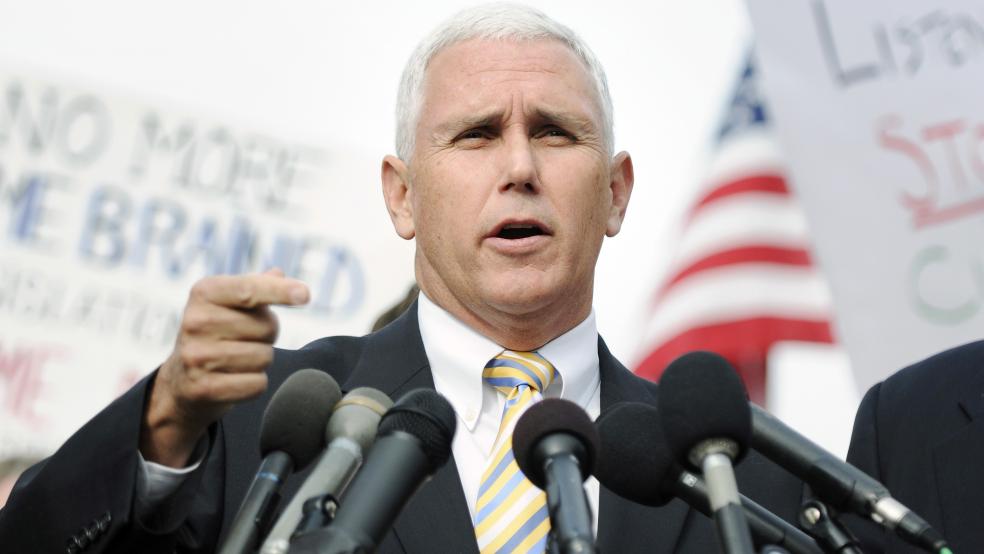Mike Pence will be Donald Trump’s choice for his vice presidential running mate, the billionaire businessman tweeted Friday morning.
Pence, the governor of Indiana, describes himself as “a Christian, a conservative and a Republican, in that order.”
Only a few days ago, Trump proclaimed that “history has said no [running mate] ever helps” a presidential nominee. Still, it seems like Trump is playing it safe with Pence, compared to controversial and potentially uncontrollable Chris Christie and Newt Gingrich. (See this article, we explain what he would bring to the GOP ticket.)
Can Governor Pence, once called a “Star of the Right,” unite Republicans and help win Trump the presidency in November?
Related: Pence Would Bring a Lot to Team Trump, at Great Political Risk
Here are some things you’ve got to know about the lifelong Hoosier, born-again Christian, “perfect conservative” who’s now the presumptive GOP vice presidential nominee:
1. Born in 1959, Pence grew up in an Irish Catholic family in Columbus, Indiana. While attending Hanover College, after what he describes as a life-changing moment in 1978, he converted to evangelical Christianity. Pence acknowledges that it is his faith that primarily shapes his politics.
2. Part of a Democratic household, Pence collected Kennedy clippings, was youth coordinator for the Bartholomew County Democrats and voted for Jimmy Carter in 1980. At Hanover, he enrolled in Constitutional and Legal History with originalist professor G.M. Curtis III and began to champion the idea of limited government.
3. He celebrated his 31st anniversary with his wife Karen this year. They have three children, Michael, Charlotte and Audrey.
Related: Mike Pence for Vice President: Maybe Trump’s Not So Crazy After All
4. After losing two Congressional races, Pence published a 1991 essay, “Confessions of a Negative Campaigner.” He proclaimed that negative campaigns are “opportunity lost…because [a candidate] could have brought critical issues before the citizenry.” He has refrained from negative campaigns since then. As Politico pointed out, that brings up a crucial question: As the vice presidential nominee, can he hit back hard enough for Trump?
5. In the House of Representatives, Pence represented Indiana’s 2nd congressional district from 2001 until 2002 and the 6th district from 2003 until 2012. During the Bush administration, he was one of the few Republican representatives to vote against No Child Left Behind and Medicare Part D expansion, votes he believes prove his ability to rise above party-line politics.
6. “Nobody hates Planned Parenthood quite as much as Mike Pence,” wrote Politico in 2011. Throughout his time in the House, Pence tried to block federal funding for abortion through Title X. He was willing to hold up Congress’ budget for the sake of this fight, making him a champion of social conservatives.
Related: Sin, Sex and Bathrooms: The GOP Crafts a Platform
7. The Koch Brothers really like him. Their political group, Americans for Prosperity, focuses on Pence’s work in Indiana as exactly the conservative agenda they want to spread across the nation. Their support would offer a lot of credibility to Trump’s campaign among donors.
8. As governor of Indiana since 2012, Pence has instituted the largest tax cut in state history. He eliminated business personal property tax for small businesses and lowered corporate income tax to strengthen Indiana’s competitive edge. He invested $800 million in roads and bridges.
9. Nationally, Pence may be most famous for the Religious Freedom Restoration Act (RFRA) of 2015. The act states that Indiana may not burden any citizen’s exercise of religion in any way. Huge protests erupted across the country in response to the legislation, and critics argued that it would hurt LGBT citizens. The governors of Washington and Connecticut and mayors of Seattle and San Francisco temporarily barred spending on travel to Indiana. Pence repeatedly denied that the act had any discriminatory implications but ultimately signed an amendment that explicitly protected sexual orientation and gender identity.
10. There was speculation that he would run for president in 2016, but Pence instead announced his intention to run for re-election as governor in May 2015. During the primary race, Pence endorsed Ted Cruz, but was careful throughout the primaries to avoid offending Trump.




